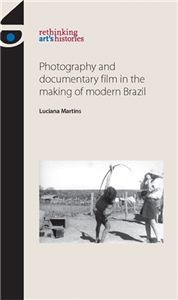Your Search Results
-
Editora do Brasil
Founded in 1943, Editora do Brasil has a wonderful history of commitment to culture and education. As a solid and experienced publisher, we are increasingly connected to the new times. One of the largest Brazilian companies in the segment, we believe in strengthening education and culture nationally and abroad. With a diverse and award-winning catalog, Editora do Brasil is always seeking to stay current and offer the best material. Our books feature a variety of themes by some of the best authors and designers, some of whom are internationally renowned.
View Rights Portal
-
Promoted ContentThe ArtsJanuary 2019
Popular cinema in Brazil, 1930–2001
by Stephanie Dennison, Lisa Shaw
Brazil has one of the most significant and productive film industries in Latin America. This ground-breaking study provides an entertaining insight into the Brazilian films that have most captured the imagination of domestic audiences over the years. The recent international success of films such as Central Station and City of God, has stimulated widespread interest in Brazilian film, but studies written in English focus on the 'auteur' cinema of the 1960s. This book focuses on individual films in their socio-historical context, drawing on extensive fieldwork in Brazil and Latin America. It argues that Brazilian cinema has almost always been grounded in intrinsically home-grown cultural forms, dating back to the nineteenth century, such as the Brazilian music-hall, the travelling circus, radio shows, carnival, and, later, comedy television. Combining a chronological structure with groundbreaking research and a lively approach, Popular cinema in Brazil is the ideal introduction to Brazilian cinema.
-
Promoted Content
-
 Trusted Partner
Geography & the EnvironmentJune 2026
Trusted Partner
Geography & the EnvironmentJune 2026Gendered urban violence among Brazilians
by Cathy McIlwaine, Paul Heritage, Miriam Krenzinger Azambuja, Moniza Rizzini Ansari, Eliana Sousa Silva, Yara Evans
-
 Trusted Partner
Film, TV & radioMay 2012
Trusted Partner
Film, TV & radioMay 2012Screening songs in Hispanic and Lusophone cinema
by Edited by Lisa Shaw and Robert Stone
In this volume, eighteen experts from a variety of academic backgrounds explore the use of songs in films from the Spanish- and Portuguese-speaking worlds. This volume illustrates how - rather than simply helping to tell the story of - songs in Hispanic and Lusophone cinema commonly upset the hierarchy of the visual over the aural, thereby rendering their hearing a complex and rich subject for analysis. Screening songs... constitutes a ground-breaking, interdisciplinary collection. Of particular interest to scholars and academics in the areas of Film Studies, Hispanic Studies, Lusophone Studies and Musicology, this volume opens up the study of Hispanic and Lusophone cinema to vital, new, critical approaches. The soundtracks of films as varied as City of God, All About My Mother, Bad Education and Buena Vista Social Club are analysed alongside those of lesser-known works that range from the melodramas of Mexican cinema's golden age to Brazilian and Portuguese musical comedies from the 1940s and 1950s. Fiction films are studied alongside documentaries, the work of established directors like Pedro Almodóvar, Carlos Saura and Nelson Pereira dos Santos alongside that of emerging filmmakers, and performances by iconic stars like Caetano Veloso and Chavela Vargas alongside the songs of Spanish Gypsy groups, Mexican folk songs and contemporary Brazilian rap.
-
 Trusted Partner
The ArtsOctober 2013
Trusted Partner
The ArtsOctober 2013Photography and documentary film in the making of modern Brazil
by Luciana Martins, Amelia Jones, Marsha Meskimmon
Photography and documentary film in the making of modern Brazil provides a major contribution to the field of visual culture through a study of still and moving images of Brazil in the first four decades of the twentieth century, when the camera played a key role in making Brazilian peoples and places visible to a variety of audiences. The book explores what is distinctive about the visual representation of Brazil in an era of modernisation, also attending to the significance of the different technical properties of film and photography for the writing of new histories of visual technologies. It offers new insights into the work of key writers, photographers, anthropologists and filmmakers, including Claude Lévi-Strauss, Mário de Andrade, Silvino Santos and Aloha Baker. Unearthing a wealth of materials from archives in the USA, Britain, and Brazil, the book seeks to contribute to the postcolonial theoretical project of pinpointing locally distinctive histories of visual technologies and practices. ;
-
 Trusted Partner
Children's & YAJuly 2021
Trusted Partner
Children's & YAJuly 2021Vielleicht Jetzt
by Carolin Wahl
Maybe Now (MAYBE Trilogy, Vol. 1) Gabriella, Joana and Karla share a flat. To finance their studies, they all work at a catering company. And the three not only realize their professional dreams, but also find the love of their lives. Gabrielle almost missed her plane in Brazil and now she sits next to this super rude guy. Great! She‘s flying to Munich to finally meet her biological father. Undercover, as she starts an internship in his catering company. On her first day in the kitchen, her instructor turns out to be, of all people, Anton. Her rude – or rather rudely handsome – seatmate from the plane! He not only lights a fire at the stove... Gabriella tries in vain to fight the sparks between them. Because Anton has clear rules when it comes to relationships at work. As hot as the Brazilian sun and as seductive as a perfect chocolate mousse! • Feel-good page turner for New Adults• Original plots in heartfelt narrations, leaving out familiar clichés• Girl power: 3 self-confident protagonists and their strong friendship• Stories about first steps towards independence: Career choices, fear of the future, parental pressure, exploring roots to find your place













